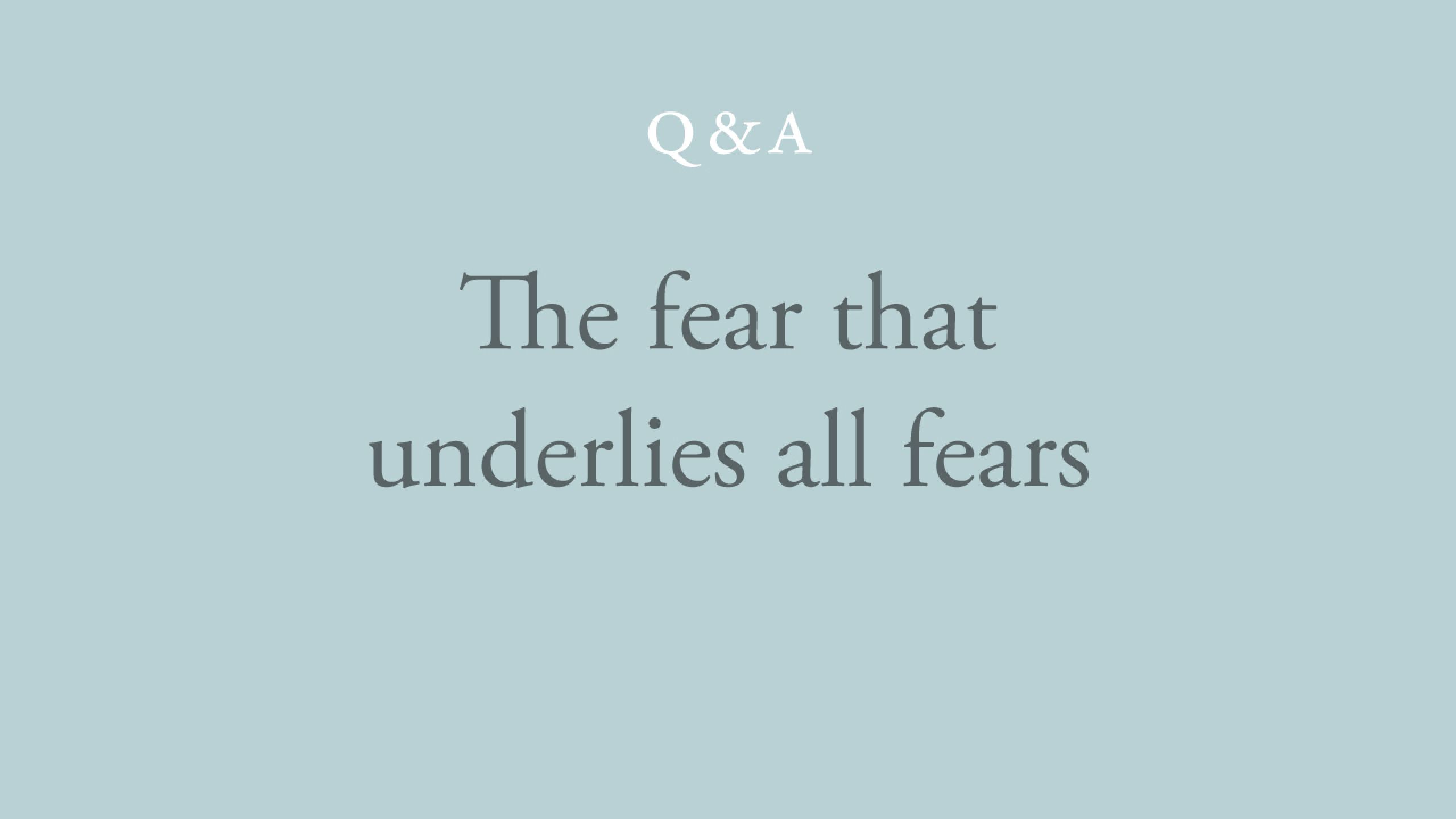My question relates to fear and anxiety. It feels to me now that they are the same underlying feeling – one I’ve had all my life – disguised in different ways. Even something as small as a text message seems to give the feeling the chance to attach itself to an object. My mind then sets off imagining worst case scenarios. In those moments I totally believe that the outside object is the problem.
Yes, the fear or anxiety has attached itself to the current situation.
I’ve had a couple of experiences that have led me to think that this might be the separate self’s fear that it will stop existing. Once, as a child, I was falling asleep and had the thought, ‘All of this is, and there is no me’. I was horrified. The second time was when you invited us, during one of your meditations, to ‘find our limits’. I couldn't find any limit and felt overwhelmed.
This is the existential fear that characterises the apparently separate self. In fact, there are two existential feelings that constitute the separate self – or rather the activity that is the separate self. The first is resistance or fear. It is the fear of death: not of physical death but of the disappearance of the psychological entity we believe and feel ourselves to be. The second is the sense of lack and the seeking that inevitably attends it. In short, resistance and seeking are the two activities that constitute the ego or apparently separate self.
In your case fear is the stronger. As you say, it is not the situation itself, the text in this case, that causes the fear. Rather, it is the existential fear that latches onto the text (or some other external circumstance), thereby supporting and legitimising itself.
This existential fear lies in the background of all your other experience – thinking, feeling, acting, perceiving, relating and so on – just as the screensaver lies in the background of whatever programmes are open on your computer.
From the point of view of one who is accustomed to looking at documents and images, the empty screen is boring. So, the purpose of the screensaver is to obscure the boring screen when no other documents or images are open on it. Like a screensaver, the existential fear in the background of your experience prevents you returning all the way back to your true nature of simply being or being aware. This return to your true nature would be felt, by the apparently separate self, as a dissolution of itself. The fear of this dissolution is, as such, the last stand of the separate self; through that it perpetuates its illusory existence. Therefore you need to take one more step back, to the screen, to the presence of awareness that is your being and that lies behind the fear.
It’s almost like the fear is a defence mechanism of the separate self. Is that right?
Yes! The separate self is not an entity; it is the activity of seeking and resisting, desiring and fearing. So if that activity subsides the sense of separation dissolves. From the point of view of the separate self, this is experienced as a kind of death. In the two experiences you mentioned (as a child and later on during the meditation), you briefly touched or returned to your true nature, but immediately the apparently separate self rose up and said to itself, ‘If I go any further in this direction I will cease to exist; I will die’. In that moment you contracted again.
Yes. Sometimes when I do my morning meditation, it’s really good for about five minutes and then that fear comes in. I start to believe that if I don’t engage with the thought streams, if I don’t worry, something awful might happen.
So when that initial fear arises, instead of thinking, ‘Oh no, I was so peaceful in meditation and here comes this old fear again,’ think, ‘Good, the fear has returned; the meditation is working’. Why? Because the activity of resisting that constitutes the core of the apparently separate self has been exposed. In fact, the apparently separate self, intuiting its imminent demise, has returned with a vengeance.
Up until now you have sought to avoid the fear by escaping from the discomfort of it into objects, substances, activities, relationships or special states of mind that you considered spiritual. If none of these were available, you escaped just by constant thinking. However, as soon as you have an agenda with the fear – controlling it, avoiding it, judging it, trying to get rid of it – you are colluding with it and thus perpetuating the apparently separate self which lives at its core.
Don’t be seduced by the fear. Instead of turning away from it, turn towards it. Feel that the fear is welcome inside of you, that is, inside the open, empty, resistanceless presence of awareness that you essentially are. This is probably the one attitude you have never taken towards your fear.
Does the fear even need to exist? Is there a reason for it other than just defending a separate self?
There is no reason for it but there’s a cause for it. It is simply one of the two ways – desiring and fearing or seeking and resisting – that the apparently separate self perpetuates itself. Remember, the separate self is not itself an entity that seeks and resists; it is the very activity of seeking and resisting. There is no separate self in the absence of seeking and resisting.
Keep returning again and again to your true nature. In time, the activities of seeking and resisting will subside and you will be left in peace.
